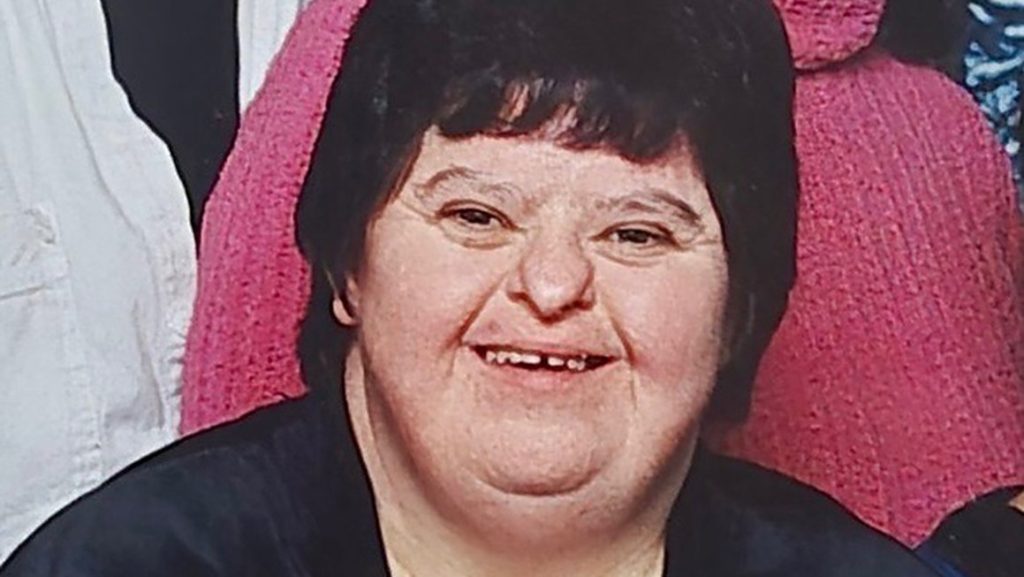Florence Girard was 55 pounds when she starved in home-share. Her sister wants change

The sister of a British Columbia woman with Down syndrome who starved to death in a Port Coquitlam home in 2018 says she believes more people will die if systemic changes aren’t made to how people with developmental disabilities are treated.
A coroner’s inquest into the death of 54-year-old Florence Girard begins Monday in Burnaby, B.C., where a jury will hear the circumstances around how she died weighing only 55 pounds.
Her sister, Sharon Bursey, described Girard as funny and sarcastic, and someone who loved spending time with her family.
Advertisement
Bursey said that since her older sister’s death, people have reached out to share similar stories of abuse against family members.
“It’s terrible, and I know it’s going to happen again, and we need to know why. How is it happening? Like, this is Canada,” she said in an interview Friday.
Girard died while living in the home of Astrid Dahl as part of a program for people with developmental disabilities, after her group home was shut down.
In 2022, Dahl was convicted of failing to provide the necessaries of life to Girard. Her initial 12-month conditional sentence was increased to 15 months in jail by the B.C. Court of Appeal.
The Kinsight Community Society oversaw the home-sharing service in Girard’s case, after being contracted by the provincial Crown corporation Community Living BC under the Ministry of Social Development and Poverty Reduction.
Advertisement
Court documents say Girard required round-the-clock care in virtually every aspect of her daily life, including being supervised while she ate.
The documents say 2012 records showed Girard was healthy and her weight an appropriate 120 pounds. They say her appetite changed in the months leading to her death, but Dahl did not arrange for her to receive any medical attention and when she died in October 2018 she weighed 55 pounds.
They say Girard’s last medical appointment for any assessment was in March 2014.
Bursey said the last time anyone with the organization in charge of the home-share program saw her sister was eight months before she died.
“I know there’s all of these protocols and handbooks and rules, but it doesn’t seem like any of them are being followed. My sister hadn’t seen a dentist in five years, a doctor in four years,” she said.
Advertisement
Tamara Taggart, the president of Down Syndrome BC, an advocacy organization created after Girard died, said there needs to be transparency around the systemic failures that led to her death.
“How did this happen? How does a person in government care starve to death when there are supposedly safeguards in place, and checks and policies, and all kinds of people, that are supposed to be monitoring individuals who are living in home shares?” she said in an interview Friday.
“So I really hope that we can find out how this happens, where the failures were and then we can move toward changing policy, or at least recommendations, so that this never, ever, ever happens again to anyone.”
Coroner’s inquests do not assign blame, but juries are asked to make recommendations for how to prevent similar deaths in the future.
Taggart, who has a son with Down syndrome, is expected to testify in the inquest.
Advertisement
She said people with developmental disabilities are treated very poorly and those assigned to care for them are not treated very well either.
“We have systemic failures here on every level. You can’t close an institution and then say, well, we’re going to just throw people in group homes and not fund them properly and not check on people, or we’re going to put them in people’s homes and not train home-share providers properly,” she said.
“There’s no standard of care. They’ll check and make sure you have a fire extinguisher on every floor of your home, but are they opening the door to say hello to somebody?”
Taggart said there are about 4,200 people in B.C. living in home-share settings but information about the Crown corporation and government-funded organizations in charge of the programs is often not made public.
“You can’t have it both ways. You can’t be getting hundreds of millions, a billion dollars really, to look after a group of people and then not be transparent about how they are being cared for,” she said.
Advertisement
“Because we don’t know how many people die in care .… We don’t hear about it unless a family member comes forward. My only motive here is (to) find out what happened and identify the systemic failures and make sure that it never happens again, so that Florence’s death is not for nothing.
“Her legacy has to be systemic change.”
This report by The Canadian Press was first published Jan. 12, 2025.
Ashley Joannou, The Canadian Press
Advertisement